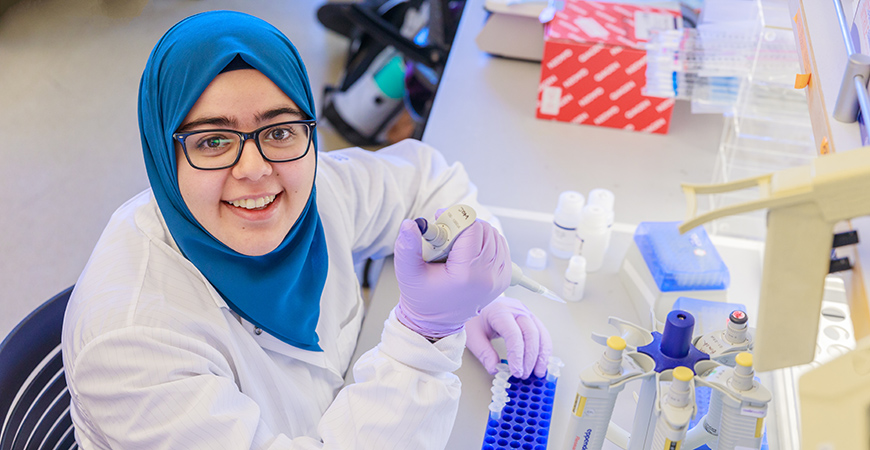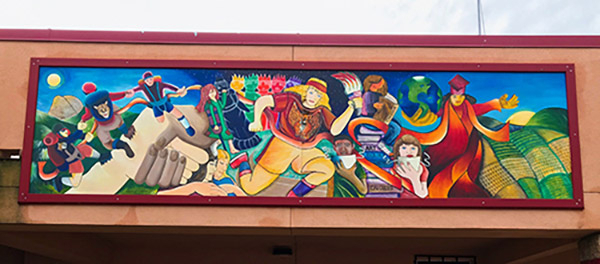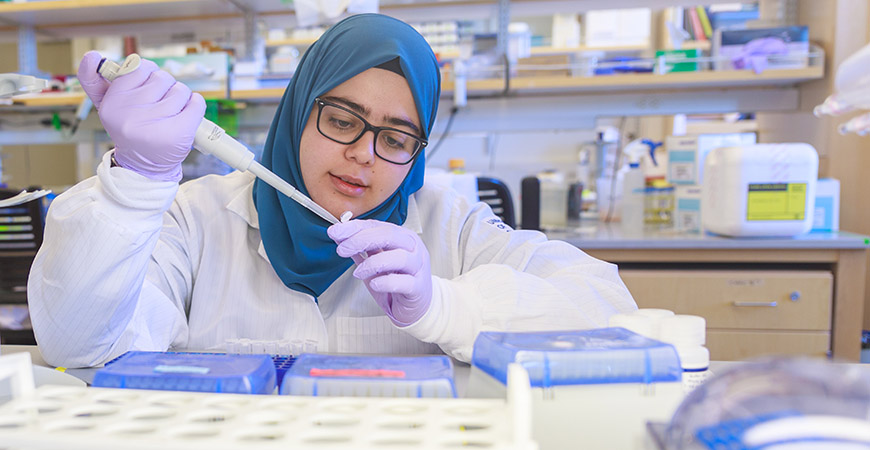
Asmaa Mohamed’s enthusiasm for research is contagious. Her passion not only radiates through her words, but it is also evident in the research career she has built in her undergraduate years at UC Merced.
Mohamed was born in Egypt. In 2013, her father accepted a position as a senior medical physicist in the Merced Cancer Center, prompting her family to move to Merced. About four months before immigrating, she began to learn common words to prepare for full English immersion.
As a high school student, Mohamed was placed into an English Learner class where she mainly listened, absorbing the language. She also enrolled in an art class, which became the catalyst for her to practice conversational English.
At an early age Mohamed remembers being very creative and drawn to art.
“I was always drawing all the time, going through so much paper and materials,” she recalls. As part of the art class, she accepted the opportunity to be one of the principal painters on a 64-square-foot mural project for her high school’s 20th anniversary.
“Talking with three other painters was a way for me to learn to communicate verbally,” Mohamed says. “I had to learn how to share my ideas, listen to theirs and collaborate.”
Read Mohamed's op-ed in the Merced Sun-Star

As a senior, she entertained pursuing her undergraduate studies at either UC Merced or UC Davis.
“I chose UC Merced because it was a small, research-based university where I could contribute,” says Mohamed. “It was financially a good decision, and there was a strong sense of community.” A biology lecture that spring solidified her decision: “I want to be here.”
Originally, Mohamed had her eyes on medical school. But after a taste of research under the supervision of Professor Jennifer Manilay, she changed direction. She says she enjoyed the process of research — asking a lot of questions, conducting the research and answering her own questions.
But mainly, “I am pursuing a career in research because the knowledge obtained from research impacts humanity for generations, and I want to be a part of that impact,” she says.
Mohamed built a foundation of research while at UC Merced, taking fellowships and internship opportunities such as the National Institutes of Health — Maximizing Access to Research Careers (NIH-MARC) Undergraduate Research Fellowship from 2017-2019, and serving as a NSF-CREST intern at UC Merced’s Center for Cellular and Biomolecular Machines (CCBM). Her role as an intern focuses on connecting the center’s research to Merced and the UC Merced community. She designs modules and activities based on the center’s research to be used in outreach events.
Mohamed also supports her peers studying contemporary biology, molecular immunology and chemistry as a learning assistant at the Calvin E. Bright Success Center and STEM Research Center. She has been a team leader for the Engineering Service Learning project Get S.E.T. and the Expanding Your Horizons Conference, and has volunteered for many on-campus events, including Bobcat Day.
Her passion for sharing her research led her to present at a dozen conferences and symposia during her undergraduate years, and she received a number of awards, notably the Outstanding Women of UC Merced Leadership Award in 2016.
“It has been a pleasure to observe Asmaa mature as a student and into a scientist: She is hardworking, diligent, methodical and willing to take risks,” says Manilay. “She is technically skilled, and loves biological research despite all of the many hours required to spend in the lab, analyzing data, troubleshooting experimental designs and thinking about, discussing and presenting the results.”
This summer, Mohamed is headed to Dartmouth College to earn her Ph.D. in the Molecular & Cellular Biology (MCB) graduate program. The highly competitive program prepares graduate students for careers in research, teaching and biotechnology.

But this isn’t her first trip to the Dartmouth labs. Mohamed spent last summer researching how a specific protein influences T cell development through the Summer Undergraduate Research Fellowship (ISURF) New Hampshire Idea Network for Biomedical Research Excellence (NH-INBRE). She is eager to return to her project and continue the research to determine how scientists can use the information in the future.
“I will be doing this science project, but I am excited to see what the applications could be,” she says with a smile. “Why is this happening this way? What is the pathway? How can we use this information?”
As for her time outside the lab, doodling on campus is still fun for Mohamed.
“I get excited about both art and science. As an artist, you connect a lot of distinct ideas to create a cohesive piece. Science is the same thing,” she says. “You have to be able to make connections between different concepts. Art empowers me to think critically and ask the questions I need to ask in research.”






